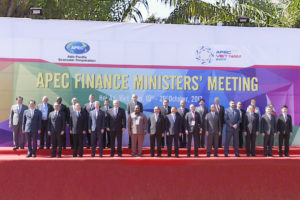On 19-21 October 2017, the 24th APEC Finance Ministers meeting was convened in Hoi An, Viet Nam under the chairmanship of H.E. Dinh Tien Dung, Minister of Finance of Viet Nam. Finance Ministers from the APEC member economies issued a joint statement reflecting the outcomes of the APEC Finance Ministers’ Meeting in Hoi An chaired by Viet Nam Finance Minister Dinh Tien Dung.
 (Photo source APEC)
(Photo source APEC)
APEC Press Release
It assesses the global and regional economy and describes joint actions to be implemented by APEC economies over the next year to achieve strong, sustainable, balanced and inclusive growth. Among them include measures to address long-term infrastructure investment, financial inclusion, base erosion and profit shifting, and disaster risk financing and insurance.
With regards to Cebu Action Plan, the statement includes the following:
“We welcome ABAC and the APFF’s contribution to the implementation of the CAP, including the recommendations on financial market infrastructure and micro insurance. We encourage continued collaboration among interested relevant stakeholders in advancing these initiatives of the CAP.”
Material
2017 APEC JOINT FINANCE MINISTERIAL STATEMENT (via APEC)
The joint statement also contains an annex on diversifying financing sources and fostering private sector involvement in infrastructure investment in APEC economies.
As for institutional investors and promoting infrastructure as an asset class, the annex includes the following:
There is a large potential to expand investment by public and private institutional investors – particularly multilateral and national development banks, pension funds, insurance companies, Sovereign Wealth Funds (SWFs) and mutual funds. Governments may review financial regulations that may potentially pose unintentional barriers to infrastructure investment by institutional investors, taking into account prudential, investor protection, and overarching financial stability objectives.
In order to attract institutional investors to the full spectrum of infrastructure assets, such assets need to be structured as attractive investment opportunities, providing revenue streams and risk-return profiles that match investors’ return expectations and liability structures.

Mack participated from the private sector the ABAC’s Executive Dialogue with APEC Finance Ministers, where participants exchanged views on infrastructure investments and Fintech among other topics. Mack also joined the APEC Breakfast Dialogue with Finance Ministers and Deputies: Addressig the Fiscal and Economic Impact of Chronic Diseases and Aging, where participants discussed heath aspects and policy recommendations. On this topic, the 2017 APEC Joint Finance Ministerial Statement mentions the following:
We welcome the exploratory dialogues between senior finance officials, Life Science and Innovative Forum (LSIF) and Health Working Group (HWG) to address the fiscal and economic impacts of the steep rise in chronic disease and of ageing societies in APEC economies. We encourage further dialogue with interested economies to share best practices and explore innovative, sustainable health financing solutions.
